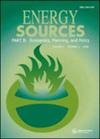可再生能源对南部非洲电力联盟(SAPP)经济增长的影响
IF 2.2
4区 工程技术
Q3 ENERGY & FUELS
Energy Sources Part B-Economics Planning and Policy
Pub Date : 2023-07-16
DOI:10.1080/15567249.2023.2234905
引用次数: 0
摘要
本文章由计算机程序翻译,如有差异,请以英文原文为准。
The impact of renewable energy on economic growth in the Southern African Power Pool (SAPP)
ABSTRACT The past decade has seen an increase in renewable energy sources in the energy mix due to global environmental and supply security concerns. This paper aimed to investigate renewable energy effects on Gross Domestic Product (GDP) in the Southern African Power Pool (SAPP). The investigation is from 1988 to 2018, using the autoregressive distributed lag (ARDL), Nonlinear ARDL (NARDL), and fully modified OLS (FMOL) techniques. Based on empirical analyses of ARDL and FMOLS, it was found that both renewable and nonrenewable energies have a positive impact on economic growth in the Southern African power pool. However, the NARDL estimation indicates that neither renewable nor nonrenewable energy has a significant effect on economic growth in Southern African power pool. Therefore, based on the findings from both ARDL and FMOLS, the growth hypothesis is supported regarding the connection between renewable energy and economic growth in the Southern Africa power pool. Centered on the results, some policy implications were drawn for SAPP for sustainable economic growth, which includes measures to increase renewable energy in the energy mix, and also to encourage the optimization of cross-border connections where energy production from countries within SAPP that are not restricted by natural resources can be relied on to export sustainable energy. Additionally, building a more sustainable integrated power system in the region will assist SAPP with sustainable energy access and reduce the dependence on nonrenewable energy within the interconnected countries soon.
求助全文
通过发布文献求助,成功后即可免费获取论文全文。
去求助
来源期刊

Energy Sources Part B-Economics Planning and Policy
ENERGY & FUELS-
CiteScore
6.80
自引率
12.80%
发文量
42
审稿时长
6-12 weeks
期刊介绍:
12 issues per year
Abstracted and/or indexed in: Applied Science & Technology Index; API Abstracts/Literature; Automatic Subject Index Citation; BIOSIS Previews; Cabell’s Directory of Publishing Opportunities in Economics and Finance; Chemical Abstracts; CSA Aquatic Science & Fisheries Abstracts; CSA Environmental Sciences & Pollution Management Database; CSA Pollution Abstracts; Current Contents/Engineering, Technology & Applied Sciences; Directory of Industry Data Sources; Economic Abstracts; Electrical and Electronics Abstracts; Energy Information Abstracts; Energy Research Abstracts; Engineering Index Monthly; Environmental Abstracts; Environmental Periodicals Bibliography (EPB); International Abstracts in Operations Research; Operations/Research/Management Science Abstracts; Petroleum Abstracts; Physikalische Berichte; and Science Citation Index.
Taylor & Francis make every effort to ensure the accuracy of all the information (the "Content") contained in our publications. However, Taylor & Francis, our agents, and our licensors make no representations or warranties whatsoever as to the accuracy, completeness, or suitability for any purpose of the Content. Any opinions and views expressed in this publication are the opinions and views of the authors, and are not the views of or endorsed by Taylor & Francis. The accuracy of the Content should not be relied upon and should be independently verified with primary sources of information. Taylor & Francis shall not be liable for any losses, actions, claims, proceedings, demands, costs, expenses, damages, and other liabilities whatsoever or howsoever caused arising directly or indirectly in connection with, in relation to, or arising out of the use of the Content. Terms & Conditions of access and use can be found at http://www.tandfonline.com/page/terms-and-conditions .
 求助内容:
求助内容: 应助结果提醒方式:
应助结果提醒方式:


